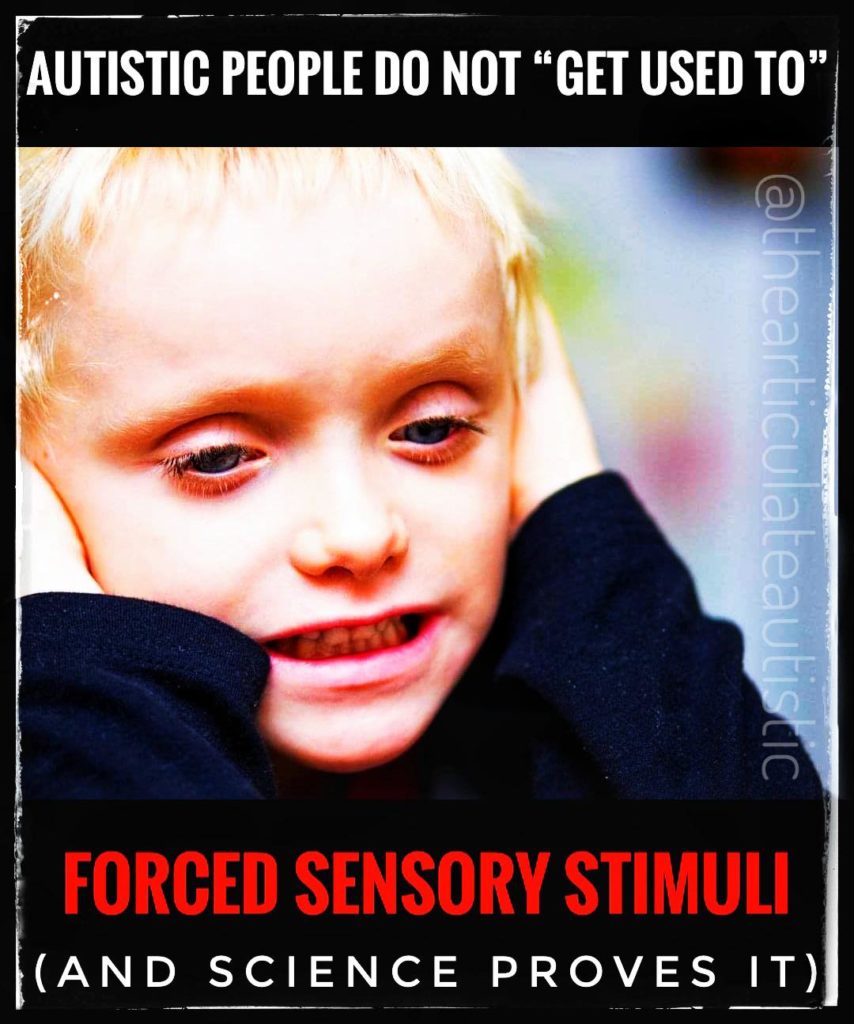Autistic People Do Not “Get Used to” Forced Sensory Stimuli (And Science Proves It)

I’ve had a working theory for years that autistic people do not habituate to sensory input the way neurotypical people do, even after repeated exposure, and it turns out I was right. Recently published studies (linked below) have proven that, indeed, autistic people do not experience sensory habituation the way neurotypical people do.
This means that ‘exposure therapy’ techniques used to force autistic children into enduring harmful sensory stimuli such as bright lights, loud sounds, and offensive textures do not make autistic children less sensitive to them.
“But my child doesn’t react the way they used to when [insert sensory stimuli here]! Exposure therapy is working!”
That depends on what you mean by “working”. Is prolonged exposure to harmful stimuli making your autistic child less sensitive, or is it causing them to dissociate? I’m willing to bet the latter, and I’m not the only one who believes this. Not only can I tell you from my own experience that I learned to dissociate from reality at a very young age to the point where I looked like I was having absence seizures (I wasn’t), there are plenty of autistic people on my Instagram page who have spoken out about their traumatic experiences, as well.
Common Traumatic Experiences Associated With Forced Sensory Exposure
(I’ll paraphrase in this section, but if you’d like to read the raw, unfiltered comments from actually autistic people on my Instagram page, click here.)
Mental Illness Misdiagnosis
While autistic people are more likely to have mental illness comorbidities, forced sensory exposure can cause the type of dissociative symptoms associated with borderline personality disorder, anti-social personality disorder, schizophrenia, and bipolar disorder. The autistic individual may not have any of these mental health conditions but still be (falsely) diagnosed and medicated, further complicating their mental and physical health as well as their identity and sense of self.
Lack of Emotional/Physical Awareness
Alexithymia is common in autistic people, and it is the inability to recognize and/or describe one’s emotions. Poor interoception is another common struggle amongst autistic people, whereby we have difficulty recognizing and responding to our body’s physical cues such as the need for water, food, sleep, the bathroom, etc.
Forced sensory exposure can further complicate these issues by forcing the brain into a permanent or near-permanent dissociative state.
Gaslighting/Threats/Abuse
Many autistic adults will tell you that the professionals they were forced to work with as children caused emotional damage not only because of the repeated exposure to harmful sensory input, but the gaslighting, threats, and abuse that went alongside these practices.
Autistic children, understandably, have frequent meltdowns and behavior that’s classified as pathological demand avoidance (PDA) when forced to endure repeated sensory assault, and the professionals working with them often lose their temper, screaming at, threatening, verbally abusing, and even physically abusing these children to scare them into “complying”.
Forced Masking
A combination of dissociation and masking is oftentimes the only way an autistic person can survive long-term forced sensory exposure.
Their brains disconnect from reality due to trauma, and they begin to mask, meaning they do all they can to repress their natural autistic traits in order to blend in as effectively as possible with their neurotypical counterparts, so the torture of forced exposure and compliance training either stops or is reduced.
Complex Post-Traumatic Stress Disorder
So many autistic people, especially late-identified autistic people and children/teens/young adults who have experienced compliance training (ABA) have complex post-traumatic stress disorder.
While PTSD occurs when one significant trauma happens in someone’s life (a car accident, a fire, a robbery, etc.), complex PTSD develops as a result of repeated and sustained trauma over the course of years or even decades–the type of trauma that develops from forced sensory exposure, gaslighting, and long-term abuse.
The Takeaway
Listen to autistic adults. You’ll only have to do a little bit of searching to find thousands of horror stories associated with forced sensory exposure and other ABA practices. We don’t want that for your children, and it’s why so many of us write about our experiences.
Read books written by autistic adults, consume content online written by us, join Autism Inclusivity on Facebook, and READ before you make a post. And parents, trust your gut, if you feel something is not right for your child, no matter how many professionals are pushing it, it probably is.
Click on the link below for a list of books written by autistic people that can help you better understand your autistic loved one.

References:




THANK YOU, THANK YOU for ALL of this. I have two autistic daughters 20, 8 yrs old. I’m eager to spread inclusivity, support and education while reducing stigmas. However, it’s been a challenge for me to fully absorb the anger adult autist’s have toward their parents BUT I also didn’t know this type of therapy existed. Forcing sounds, frequencies and bright lights! That’s a form of torture not therapy! No wonder adult Autistic’s are resentful. Grateful for these insights!
I’m a teenager with undiagnosed autism, and hearing sensitivity is one of my major problems. Forced sensory exposure is torture in every way; I keep earplugs on me at all times to help mitigate the issues. But when I don’t have them in, I have to deal with sounds that seem to bother nobody else yet are painful to my ears; I’ve learned to add it to the many things shoved under the surface. This is one of the reasons I don’t want a diagnosis (yet); if normal sounds and lights are this bad, I’m not dealing with people forcing it. My point is, I’m glad you recognize that. Sensory sensitivity is a painful thing, and someone has to say “that’s not okay”. So thank you.
My daughter attended her transition program and according to her, she was forced to not wear her headphones at a live theater show as to “not have others think you are being rude.” She had a headache for two days. It was an opportunity for us to discuss her rights as an individual. It’s part of her IEP and 504 plan. She was put in a very uncomfortable situation. She did her best to as balance between being a self-advocate and stating her needs vs being “argumentative” with authority figures aka teachers in her program.
I’m so proud of her, and she’s got a good mom! I hope she’s allowed to use her sensory aids from now on without problems.
If balloon popping is no longer startling, I think a possible reason is that they impaired their hearing. A study showed that it can be as high as 168 dB which is louder than some gunshots, so being startled by it seems normal to me.
Personally, I avoid loud impulsive noises that cause ringing in my ears to protect my hearing. It’s also harmful to permanently desensitize their hearing because if they lose a sense of how loud it is, they might expose themselves to even more loud noises which can cause further hearing impairment. Hearing loss also separates us from people.
Thank you so much for talking about the studies and linking them under your article, they helped a lot! Do you know if this kind of “therapy” is still practised? It sounds so aweful that I had to cry reading about it. I am very glad that the autism support we have does not involve such things at all – in the contrary it is all about setting boundaries, listening to oneselves needs etc.
You’re welcome! As far as I know, yes. This is definitely still practiced. It’s called ABA, and it’s horribly abusive.
fully agree. Reduces the humanity and responses which are defenses to nil. Inhumane Pavlovian conditioning,
As always, Jaime so much to digest within this article! so much resonance again, with my early experiences! c-PTSD always seemed so huge a term for what I went through, but now, I see it is not so much an oversized thing as compared to what I went through bit rather what I went through was hugely damaging!!!! Hoping come Friday your book will arrive with me and I’ll be able to have a good read over the weekend!!!
Sometimes you have to force it, like brushing teeth. I had to make him get used to brushing his teeth and taking medicine. I hated doing it but I had to do it. 🙁